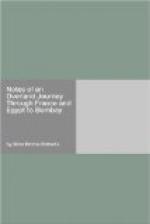I have accomplished a second drive through the coco-nut gardens on the Girgaum road, a name by which this quarter of the native town is more commonly known; the view thus obtained only excited a desire to penetrate farther into the cross-lanes and avenues; but as I do not ride on horseback, I have little chance of succeeding, since I could not see much from a palanquin, and taun-jauns, so common in Calcutta, are scarcely in use here. The more I see of what is called the Native Town in Bombay, the more satisfied I am of its great superiority over that of Calcutta; and I gladly make this admission, since I have found, and still continue to find, so great a falling-off in the style of the dress, whether it relates to form, material, or cleanliness. I have lately observed a very handsome turban, which seems worn both by the Mohammedans and Hindus, of red muslin, with gold borders, which is an improvement.
A taste for flowers seems universal, plants in pots being continually to be seen on the ledges of the porticoes and verandahs; these are sometimes intermingled with less tasteful ornaments, and few things have struck me as more incongruous than a plaster bust of a modern English author, perched upon the top of a balustrade over the portico of a house in the bazaar; mustachios have been painted above the mouth, the head has been dissevered from the shoulders, and is now stuck upon one side in the most grotesque manner possible, looking down with half-tipsy gravity, the attitude and the expression of the countenance favouring the idea, upon the strange groups thus oddly brought into juxta-position. The exhibition is a droll one; but it always gives me a painful feeling: I do not like to see the effigy of a time-honoured sage abased.
The statue of Lord Cornwallis, on the Esplanade—which, being surrounded by sculptured animals, not, I think, in good taste, might be mistaken for Van Amburgh and his beasts—is close to a spot apparently chosen as a hackney-coach stand, every kind of the inferior descriptions of native vehicles being to be found there in waiting.
Some of the bullock-carriages have rather a classical air, and might, with a little brushing up and decoration, emulate the ancient triumphal car. They are usually dirty and shabby, but occasionally we see one that makes a good picture. The bullocks that draw it are milk-white, and have the hanging dewlap, which adds so greatly to the appearance of the animal; the horns are painted blue, and the forehead is adorned with a frontlet of large purple glass beads, while bouquets of flowers are stuck on either side of the head, after the manner of the rosettes worn by the horses in Europe.
A very small pair of milk-white bullocks, attached to a carriage of corresponding dimensions, merely containing a seat for two persons, is a picturesque and convenient vehicle, which will rattle along the roads at a very good pace. These bullocks usually have bells attached to their harness, which keep up a perpetual and not disagreeable jingle. The distances between the European houses are so great, and the horses able to do so little work, that it seems a pity that bullocks should not be deemed proper animals to harness to a shigram belonging to the saib logue: but fashion will not admit the adoption of so convenient a means of paying morning visits, and thus sparing the horses for the evening drive.




